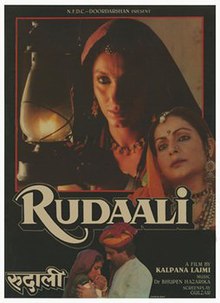| Rudaali | |
|---|---|
 Poster | |
| Directed by | Kalpana Lajmi |
| Written by | Gulzar |
| Based on | Rudaali by Mahasweta Devi |
| Produced by | Ravi Gupta Ravi Malik NFDC Doordarshan |
| Starring | Dimple Kapadia Raj Babbar Raakhee Amjad Khan |
| Cinematography | Santosh Sivan Dharam Gulati |
| Music by | Bhupen Hazarika |
Release date |
|
Running time | 115 minutes[1] |
| Country | India |
| Language | Hindi |
Rudaali (pronounced "roo-dah-lee"; transl. Female weeper)[a] is a 1993 Indian Hindi-language drama film directed by Kalpana Lajmi, written by Lajmi and Gulzar and based on a 1979 short story of the same name by Bengali author Mahasweta Devi. Set in a small village in Rajasthan, the film stars Dimple Kapadia as Shanichari, a lonely and hardened woman who, despite a lifetime of misfortune and abandonment, is unable to express grief through crying and is challenged with a new job as a professional mourner. Raakhee, Raj Babbar, and Amjad Khan appear in supporting roles. Produced by the National Film Development Corporation of India and Doordarshan, the film was labelled part of India's neo-realist parallel cinema, but it employed several of the common elements of mainstream Hindi cinema, including songs composed by Bhupen Hazarika.
Rudaali was a critical and unexpected commercial success. Particular critical praise was directed at Kapadia's performance, with further appreciation of the film's script, music, technical achievements, and Lajmi's direction. The film won three National Film Awards, including Best Actress for Kapadia, and was nominated for three Filmfare Awards, earning Kapadia a Critics Award for Best Performance. Kapadia won Best Actress honours at the 8th Damascus International Film Festival and the 38th Asia-Pacific Film Festival, where Hazarika was awarded for his music. The film was selected as the Indian entry for Best Foreign Language Film at the 66th Academy Awards, but was not nominated.
- ^ "Rudaali". British Board of Film Classification. 22 June 1993. Archived from the original on 17 February 2022. Retrieved 17 February 2022.
- ^ "Rudaali". University of Iowa. Archived from the original on 19 October 2013. Retrieved 1 September 2014.
- ^ Pillai, Tripthi (1 August 2020). "Mourner-confessors: The masala intercommunity of women in Rudaali and Hamlet". Postmedieval. 11 (2): 243–252. doi:10.1057/s41280-020-00178-5. ISSN 2040-5979. S2CID 225504336. Archived from the original on 13 February 2022. Retrieved 13 February 2022.
- ^ Chatterji 2020, pp. 36–37.
Cite error: There are <ref group=lower-alpha> tags or {{efn}} templates on this page, but the references will not show without a {{reflist|group=lower-alpha}} template or {{notelist}} template (see the help page).